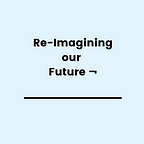Re-Imagining Homelessness
What if we ended “homelessness” first by getting rid of the term and replacing it with an open question about the nature of at-homeness and the conditions required for being at home in one’s community — and by looking at the more and less healthy categories of experience this involves all over the world?
Instead of assigning people to the “housed” and “unhoused” categories, where the latter need support to become and stay “housed,” what if we recognized a range of possible and often self-organized means of sheltering that might be semi-permanent and migratory? What if we insisted on them being honoured ways of dwelling rather than criminalizing them or classifying them as poverty or charity?
What if we looked to the specific forms of extraction and predation at work in all our communities at every level and engaged everyone in the duty of care — to mitigate and prevent harm everywhere instead of trying to replenish our overdrawn “social capital” with the shadow work and subsidies of parents, volunteers, government, and other organizations?
When was the last time you stopped and talked to a homeless person? Could you imagine yourself as someone who could potentially be homeless? Would you ever want to? I (Dan R.) remember while growing up it was my aspiration to become a garbage collector and live outdoors in my community. Beneath my naivete, there was a deep sense of excitement that came from the idea of spending the majority of my time outdoors.
In Spain, I remember there were various outdoor public sleeping spaces — mostly they were catering to the van community. What if we re-imagined our public spaces, and created simple, and highly functional, outdoor public resting spaces? What if these were in enough places that there was not a competition to fight for these?
What if there were more perks built into our communities that made not owning a house or paying regular rent a possible option? Places where people could live communally, outdoors, travel to different places, stay with family and friends etc. at different parts of the year, and contribute their unique gifts to each space, and naturally learn from the different people they interact with. Could you imagine a family with children living this way? And the unique interactions and skills that are passed on by these people being a major part of their child’s education? Do you think that this style of living, sharing spaces, and enabling the transference of collective wisdom would make people more connected and happy? Do you think it would be good for the environment? Could you imagine being homeless? Can you think of ways to compassionately give more respect and support to the homeless people in your community?
Lead Author: Dan Knauss (first 3 paragraphs)
Dan Knauss lives in Edmonton, Alberta where he is wasting ministry time and paper.
Anchor Author: Daniel Rudolph
Dan Rudolph has been living and working in different countries for the past decade. He is dedicated to re-imagining education and enabling opportunities for experiential learning and connection. One of his current passions is learning and spreading juggling.
Dan will be co-facilitating Re-Imagining Our Future, an online course offered by the Charter For Compassion’s Education Institute, starting October 26, 2020.
